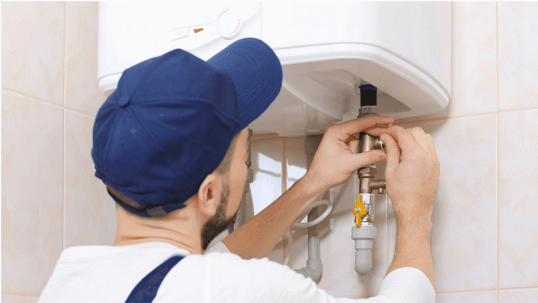Typical Heater Issues And Solutions
Typical Heater Issues And Solutions
Blog Article
This article following next in relation to Water Heater Repair and Troubleshooting is rather enjoyable. Check it out for yourself and figure out what you think about it.

Envision beginning your day without your regular hot shower. That currently sets an inadequate tone for the rest of your day.
Every home requires a reliable hot water heater, however just a few know how to take care of one. One simple method to keep your hot water heater in top form is to look for mistakes regularly as well as repair them as soon as they appear.
Bear in mind to turn off your hot water heater before sniffing around for mistakes. These are the water heater mistakes you are more than likely to experience.
Water also warm or also cold
Every hot water heater has a thermostat that establishes exactly how hot the water gets. If the water coming into your house is too hot regardless of setting a convenient optimum temperature level, your thermostat might be defective.
On the other hand, also cold water may be due to a stopped working thermostat, a broken circuit, or inappropriate gas flow. For instance, if you make use of a gas water heater with a damaged pilot light, you would certainly obtain cold water, even if the thermostat remains in perfect problem. For electric heaters, a blown fuse may be the perpetrator.
Insufficient hot water
Hot water heater been available in numerous dimensions, depending upon your hot water demands. If you run out of hot water before every person has actually had a bathroom, your water heater is too little for your family size. You need to consider mounting a bigger water heater storage tank or opting for a tankless hot water heater, which occupies less space and is much more resilient.
Weird noises
There are at the very least five sort of sounds you can speak with a water heater, yet one of the most common interpretation is that it's time for the hot water heater to retire.
Firstly, you should recognize with the regular seems a water heater makes. An electric heater might seem various from a gas-powered one.
Popping or banging noises typically suggest there is a piece of debris in your containers, as well as it's time to cleanse it out. On the other hand, whistling or hissing audios might simply be your valves allowing some pressure off.
Water leaks
Leakages might originate from pipelines, water connections, valves, or in the worst-case situation, the tank itself. With time, water will certainly wear away the storage tank, as well as discover its way out. If this occurs, you need to replace your water heater asap.
Nevertheless, before your adjustment your entire tank, make certain that all pipelines are in place which each valve functions completely. If you still need assistance determining a leakage, call your plumber.
Rust-colored water
Rust-colored water means one of your hot water heater components is corroded. It could be the anode pole, or the storage tank itself. Your plumber will certainly have the ability to determine which it is.
Lukewarm water
No matter just how high you established the thermostat, you won't get any type of warm water out of a heating unit well past its prime. A hot water heater's effectiveness might lower with time.
You will additionally get lukewarm water if your pipes have a cross link. This means that when you activate a tap, warm water from the heating unit streams in along with normal, cold water. A cross connection is very easy to place. If your warm water faucets still run after closing the water heater valves, you have a cross connection.
Discoloured Water
Rust is a significant reason for unclean or discoloured water. Deterioration within the water tank or a stopping working anode rod can cause this discolouration. The anode pole safeguards the tank from rusting on the within and should be checked annual. Without a pole or an effectively functioning anode pole, the warm water rapidly rusts inside the tank. Get in touch with a professional hot water heater technician to figure out if replacing the anode rod will repair the issue; if not, change your water heater.
Conclusion
Preferably, your hot water heater can last one decade before you require a modification. Nonetheless, after the 10-year mark, you might experience any of these faults much more routinely. At this point, you ought to include a brand-new hot water heater to your budget plan.
How To Troubleshoot 3 Common Water Heater Problems in Twin Cities
The Water Heater Is Leaking
A leaky cold water inlet valve A loose pipe fitting A leaky temperature and pressure relief valve A corroded anode rod A cracked tank Turn Off Your Water Heater:
Shut off your gas water heater by turning the gas valve on the unit to the “OFF” position. Shut off your electric water by switching its power off at your electrical panel. Look for a two-pole breaker labeled “water heater” and turn it to the “OFF” position. Move the ball valve connected to the water heater to be perpendicular to the piping at a 90° angle. Look for the Leak:
Depending on whether the water is coming from the tank's top or bottom, you’ll want to look for the leak in different locations.
If the leak comes from the top of the tank, carefully look for water escaping from the cold water inlet valve or loose pipe fittings. Rusted hot and cold water valves can have loose connections with the tank, with water leaking out of them.
https://mspplumbingheatingair.com/blog/how-to-troubleshoot-3-common-water-heater-problems
I ran across that entry on Common Problems with Your Home Water Heater while doing a search on the internet. Are you aware of someone else who is occupied with Water Heater Repair and Troubleshooting? Take a moment to promote it. Thank you for your time. Don't hesitate to visit our site back soon.
Schedule Today Report this page